A well-structured B2B travel platform is no longer just a nice-to-have. It has become an integral tool, ensuring traveler comfort, cost-effective, and efficient operations.
This guide probes the specifics of building a custom B2B travel booking platform particularly tailored for corporate travel. It encompasses understanding the essence of B2B travel platforms, the unique dynamics of corporate travel, and a short walkthrough on how to build one.
Understanding corporate travel management and its unique needs
Corporate travel management is a specialized business function that involves managing, coordinating, and optimizing an organization's travel strategy. It's a systematic approach to handling various travel operations such as hotel bookings, flight tickets, travel programs, and reporting for the purpose of cost control, adherence to corporate policies, and employee comfort and safety.
Corporate travel management comes with its unique set of needs and challenges.
Legacy GDS limitations. With airlines such as United and American shifting content away from legacy Global Distribution System (GDS) channels towards their own platforms and NDC-enabled channels, businesses that work with traditional GDSs face a challenge. The underdeveloped state of NDC adoption and the reliance on legacy GDS channels (EDIFACT) pose a significant challenge for all businesses, particularly Travel Management Companies (TMCs) that largely depend on GDSs. As the industry is currently in the middle of this transition, companies that adapt swiftly will be better positioned to offer their clients a wider array of options.
Our dedicated article lets you learn more about how NDC impacts air travel.
Distinct feature sets compared to leisure travel. Corporate travel has distinct needs compared to leisure travel. Features such as expense management, policy compliance, risk management, and detailed reporting are critical in a corporate travel booking system. Moreover, businesses often need the ability to book multiple rooms or flights, arrange complex itineraries, and manage changes and cancellations efficiently.
Different booking flow. Corporate travel managers must consider factors like travel policies, preferred vendors, traveler safety, budget constraints, and approval workflows. Therefore, B2B travel platforms should handle these intricacies, ensuring they can source and process bookings accordingly.
But what does a B2B travel platform entail? Let's delve into this.
What is a B2B travel platform in the realm of corporate travel management?
A B2B travel platform for corporate travel management is a comprehensive digital tool designed to simplify the organization and management of business travel. Such software aims to streamline the process of sourcing, booking, and managing travel services. It achieves this by gathering, structuring, and distributing detailed travel product data from various sources. These sources typically encompass leading GDSs (Amadeus, Sabre, and Travelport), direct airline connections, hotels, vacation rentals, car rental companies, and more.
B2B corporate travel platforms are purposely designed to address the diverse requirements of businesses. They primarily serve three categories of end users.
Corporate travel managers (CTMs) take care of all travel arrangements and policies, often booking flights, accommodations, and other services, especially for groups of travelers or higher-tier employees. They establish corporate travel guidelines, deal with employee travel expenses, and handle reimbursements.
Business travelers may use the platform to self-book travel within company guidelines. After their trips, they submit expenses and their detailed itineraries.
Finance departments are stakeholders who audit travel expenses to ensure adherence to company policies and harness travel data for budget projections and cost-saving insights. Their interaction is centered around reporting, analytics, and oversight features.
While the foundational elements of these platforms are consistent, the interface and experience are tailored to cater to the distinct responsibilities of each user group.
In addition to collating vast amounts of data, these platforms are typically designed with capability to interface with various third-party travel APIs. This feature provides them with access to a wide-ranging and diverse global inventory. Therefore, they are exceptionally adept at catering to corporate travelers' unique needs and preferences. This flexibility ranges from booking flights with specific airlines and reserving accommodations in particular hotels to arranging transportation and coordinating ancillary services or activities. As such, a B2B corporate travel platform offers an all-encompassing solution to the complexities of managing corporate travel.
B2C vs. B2B booking software: What is the difference?
In the travel management landscape, both B2B and B2C travel booking platforms, developed by individual software vendors (ISVs), serve distinct roles and cater to different users.
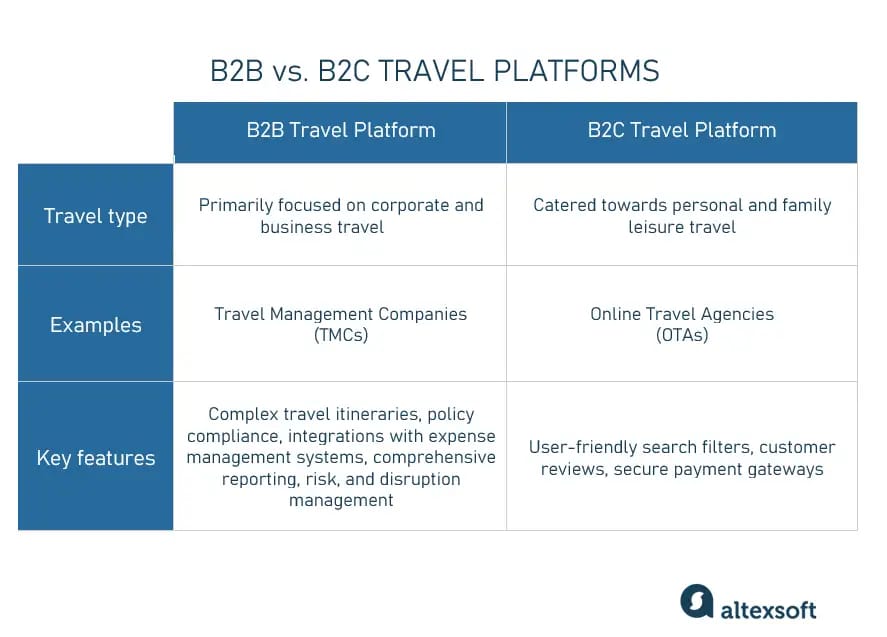
B2B vs B2C travel platforms.
B2B platforms are primarily utilized by TMCs and corporate travel managers who are responsible for arranging travel for multiple employees or groups within a company. B2C platforms, on the other hand, are typically employed by online travel agencies (OTAs) to serve individual leisure travelers planning personal or family trips.
The feature set of these platforms further illustrates their different purposes. B2B platforms are designed to handle the intricate nature of corporate travel. They have features for handling complex travel itineraries, policy compliance monitoring, integration with expense management systems, and comprehensive reporting tools. Furthermore, they are particularly tailored for risk and disruption management, essential elements in the corporate travel realm.
B2C platforms, while also capable of advanced functionalities, primarily focus on providing tools and features catering to an individual traveler's needs, such as search filters, customer reviews, and secure payment gateways.
So while both types of platforms can have varying levels of complexity, the key difference lies in their intended user base and functional requirements — B2B platforms are designed with corporate needs in mind, while B2C platforms cater to the requirements of individual consumers.
How B2B travel portals work: Key modules of a B2B travel platform
The B2B travel platform is built around key modules designed to handle a specific B2B travel business aspect. These modules encompass functionalities ranging from supplier integration, booking management, expense management, and sophisticated reporting and analytics. Understanding how these key components work is fundamental to leveraging the platform's capabilities for a streamlined and successful B2B travel operation.
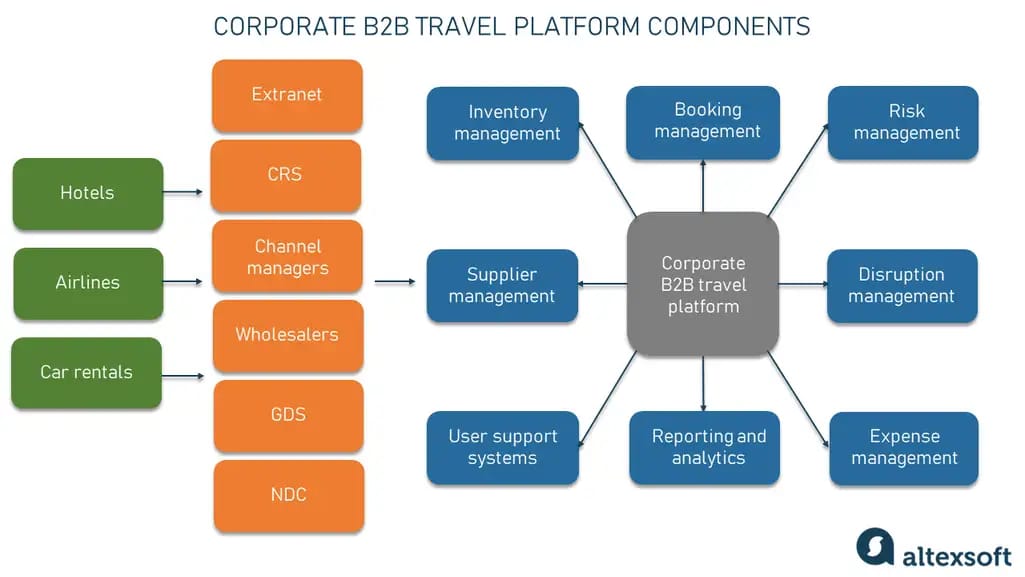
B2B travel platform components.
Supplier management
Supplier management involves overseeing and optimizing the connections between a platform and the travel services providers, such as airlines, hotels, and car rentals. Yet, for corporate travel management, it's not just about accessing a vast inventory but about strategically selecting and managing suppliers that cater to the particular needs of business travelers.
So supplier management for B2B corporate travel platforms involves a combination of the following things.
Supplier selection. Choosing suppliers based on their offerings, including cost, convenience, quality, and reliability, such as airlines with frequent business routes, hotels located near business districts, and car rental services for corporate clients.
Integration methods: Different methods of supplier connection exist to facilitate the seamless management of diverse suppliers.
- Manual data entry through CMS (Content Management System): Data might be manually managed for niche suppliers with unique offerings vital for some businesses.
- Extranet connection: This portal is for suppliers who might not have automated APIs or traditional GDSs. Through the extranet, they can manually update their content, including rates and availability.
- Central Reservation System (CRS) connection: Many larger suppliers (like hotel chains) have their own CRS. By connecting directly to a supplier's CRS, the B2B platform can access real-time inventory, rates, and booking information, streamlining management of these suppliers.
- Channel manager connection: Channel managers are third-party systems that consolidate inventory data from multiple suppliers. A B2B platform can manage these suppliers more efficiently by connecting to a channel manager instead of configuring separate connections to each supplier.
- Wholesaler connection: Wholesalers or bed banks bridge the gap between B2B travel platforms and numerous smaller or independent hotels. These connections offer access to various accommodation options, from mainstream hotels to boutique establishments suitable for different business traveler's preferences.
- GDS connection: GDSs aggregate and distribute travel inventory from various suppliers, encompassing airlines, hotels, car rental companies, and more. They are essential for accessing a broad range of options. But for corporate platforms, filters can be applied to streamline results more suited for business travel.
- NDC connection: NDC is a paradigm shift introduced by IATA in 2015 to upgrade the decades-old EDIFACT data exchange traditionally used by GDSs. As an XML-based standard, NDC facilitates direct, dynamic communication between airlines and travel platforms likeTMCs, OTAs, and metasearch engines. By establishing an NDC connection, a B2B corporate travel platform can gain direct access to an airline's complete range of offerings, from seat availability to ancillary services like extra baggage allowance and onboard Wi-Fi.
Tailored offerings. For a corporate B2B platform, supplier management also involves customizing the offerings. For example, the platform could prioritize direct flights, ensure a range of quality accommodations near major business districts, or offer specialized car rental services that provide models commonly used by businesses.
Inventory management
Inventory management is a B2B travel platform component that gathers information about various travel services from multiple suppliers and presents it in an easily accessible format for corporate travel departments to book. It acts as the platform's "storefront," showcasing various services users can explore and reserve.
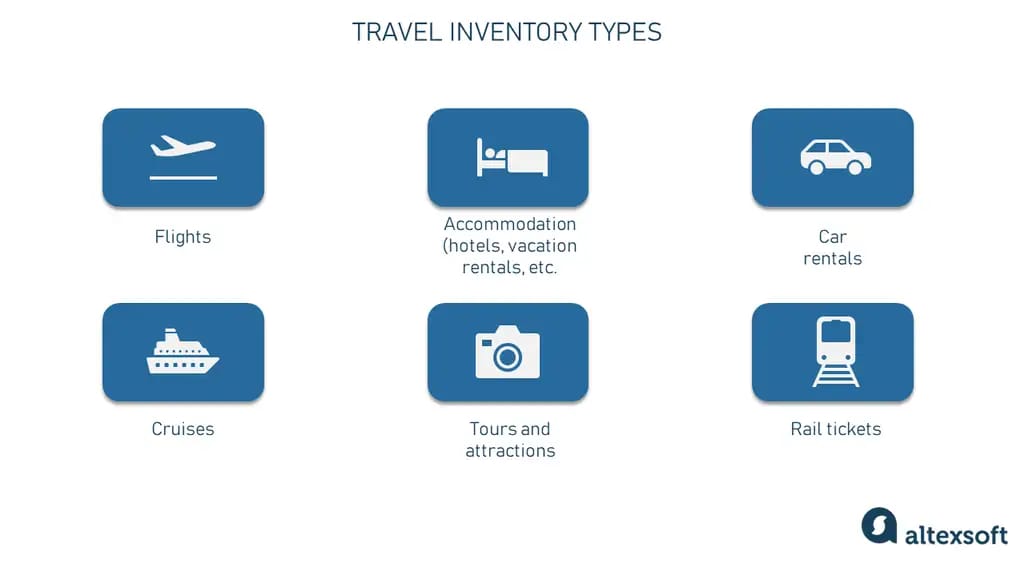
Travel inventory types.
The inventory management process starts once supplier connections are established and overseen through the supplier management feature. This operation involves extracting details from various suppliers, such as airlines offering convenient flight times, hotels near business districts or MICE venues, and transportation options prioritizing efficiency and punctuality.
Given suppliers' vast and varied nature, corporate B2B platforms prioritize standardizing the collected data to suit a business environment. This involves categorizing services and ensuring alignment with company travel policies. Options may be filtered or prioritized based on price caps, preferred vendor agreements, or even factors like eco-friendliness for companies that support sustainable travel.
Booking management
The real voyage commences once inventory from diverse suppliers is pooled and organized. Whether it's a CTM overseeing multiple employees’ travels or an individual business traveler making their own arrangements, the platform's user-centric booking engine steps into action.
By the way, we have an interesting and informative video for those who want to know how a booking engine works in OTA.


OTA booking engines explained
Back to our topic, here's a snapshot of how a typical corporate travel booking flow unfolds.
User authentication and role identification. A secure login ensures that the platform's environment is tailored to the user's role and aligns with the permissions and associated privileges.
Travel search and selection. An advanced search mechanism empowers users to go through a vast inventory swiftly. The behind-the-scenes machinery ensures only policy-compliant options surface, optimizing the selection process.
Policy сompliance and approval. Many corporations have layered approval workflows, especially for high-ticket bookings. The system automates these checks and sends bookings to managers for approval when necessary.
Booking and payment. Once travel options are finalized and (if required) approved, the user proceeds to the payment. Depending on the company's arrangement, this could be done through a corporate credit card, a departmental budget, or even the employee's card (to be reimbursed later). The platform securely processes the transaction and confirms the booking with the supplier.
Itinerary and travel details. Post-booking, the platform generates a detailed itinerary sent to the traveler. CTMs dealing with multiple bookings can access, manage, and distribute these itineraries as required. Many platforms also allow integration with personal or corporate calendars, automatically adding travel details. This ensures reminders, check-in prompts, etc.
Post-travel expense management. The journey doesn't end once the trip concludes. Business travelers can submit additional expenses, which are then streamlined through approval workflows for reimbursement.
The backbone of this entire flow is the platform's robust interface, ensuring CTMs and business travelers alike can navigate and manage their travels efficiently.
Risk management
Risk management in a B2B travel platform involves a holistic approach that addresses travel safety and financial risks and emphasizes compliance with regulations and corporate policies.
It’s aimed at identifying, evaluating, and mitigating all potential threats. For instance, platforms might have features that analyze real-time data to identify high-risk travel destinations. They might alert the user before a booking is made, ensuring the employees safety and compliance with corporate policies.
Apart from travel risk assessment, it can include communication and location tools, integrated risk data, and policy compliance management. For example, platforms like SAP Concur and TravelPerk take a proactive approach to risk management by integrating it with their travel and expense solutions. Such software offers complete visibility into travel and expense data, enabling businesses to anticipate and address potential risks before they escalate. This includes identifying unusual expenses or deviations from established travel policies and ensuring compliance with regulatory requirements.
Disruption management
Disruptions in corporate travel can range from the mundane — like flight delays or cancellations — to the severe, such as political upheavals or global health crises. Effective disruption management ensures that the impact of these unforeseen events on travelers and the broader travel program is minimized. Disruption management in B2B travel platforms is centered around four core functionalities.
Real-time alerts. As soon as a potential disruption is detected, the platform informs the traveler and the corporate travel manager. This timely notification system ensures everyone is on the same page and can take corrective action immediately.
Predictive analytics. By leveraging historical data and current trends, machine learning algorithms can predict potential disruptions. This proactive approach lets companies plan alternate arrangements or reroute travel to avoid problem areas.
Flexible cancellations and rebooking. In the event of an unforeseen change, platforms offer features that allow for easy cancellation and rebooking. This gives businesses the agility they need to handle disruptions without incurring excessive costs.
In our collaboration with Cornerstone, we focused on these very aspects. We enhanced the user experience by introducing intuitive dashboard navigation and streamlining the booking process, thus facilitating more efficient management of disruptions.
Emergency assistance integration. Some platforms integrate with third-party services to provide travelers with immediate access to local assistance or medical aid. This ensures the safety and well-being of corporate travelers, even in challenging situations.
Many B2B travel platforms incorporate such features. For example, TravelPerk offers real-time alerts, a degree of flexibility with its cancellations, and integrates with various services to aid travelers during disruptions.
Expense management
Incorporating expense management in corporate travel platforms is imperative to ensure the systematic recording, reporting, and reconciling of all business travel-related expenditures.
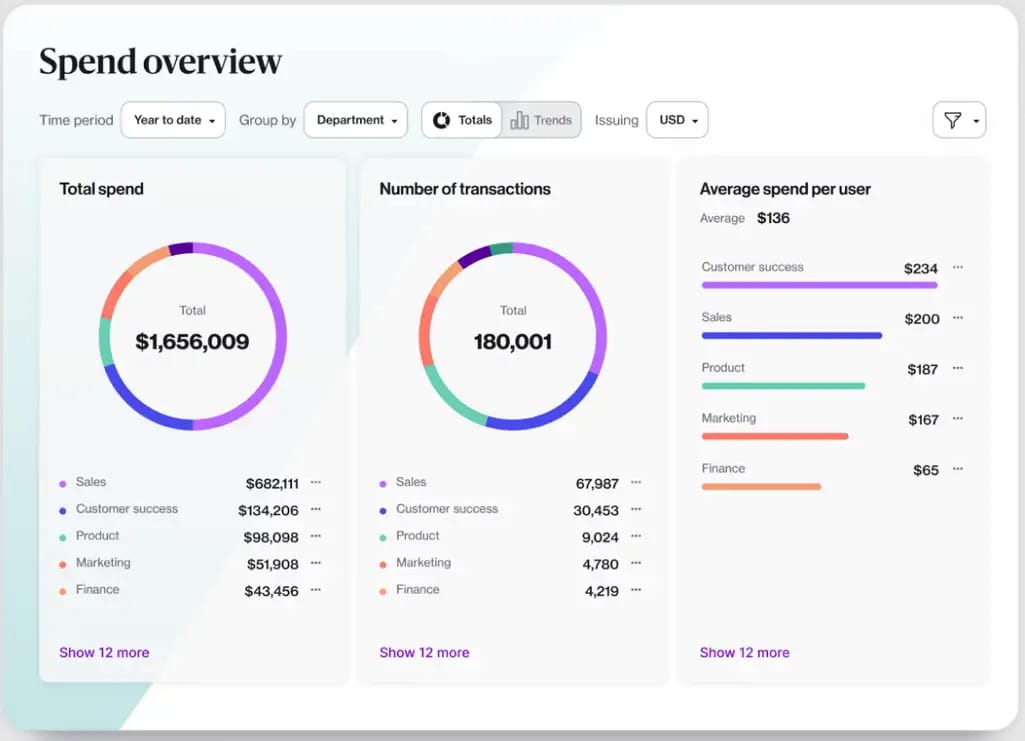
Real-time reporting of all expenses. Source: Navan (Formerly TripActions)
This function goes beyond merely cataloging expenses.
Automated data capture. Efficient expense management solutions can instantly import expenses from various sources, including credit card statements and electronic receipts, reducing the need for manual entry and the associated human error.
Policy compliance monitoring. Modern platforms can cross-reference expenses against the company's travel and spending policies. If any anomalies or violations are detected, the system can generate instant alerts, ensuring real-time compliance.
Integration with booking components. Direct integration with booking solutions can offer a consolidated view of planned expenses versus actual spending, giving companies better budget oversight.
Real-time reporting and analytics. Many platforms offer instant insights, allowing finance and travel managers the option to monitor expenditures as they occur. This feature can complement traditional month-end or batch reporting, catering to varying budget planning cycles within companies.
Fraud detection and prevention. By analyzing historical data and noting regular spending patterns, these systems can swiftly identify any anomalies, flagging potentially fraudulent transactions for review.
Mobile functionality. Recognizing the need for on-the-go expense reporting, especially for frequent travelers, many solutions now provide mobile apps that allow instant expense capture, approval workflows, and real-time insights.
In the realm of corporate travel, B2B platforms like TravelBank and Navan embody these features by offering integrated solutions. They emphasize seamless data capture, real-time compliance checks, and comprehensive analytics to make expense management as intuitive and efficient as possible.
Reporting and analytics
A good B2B corporate travel platform should utilize advanced analytics to offer companies vital insights into their travel habits and expenses.
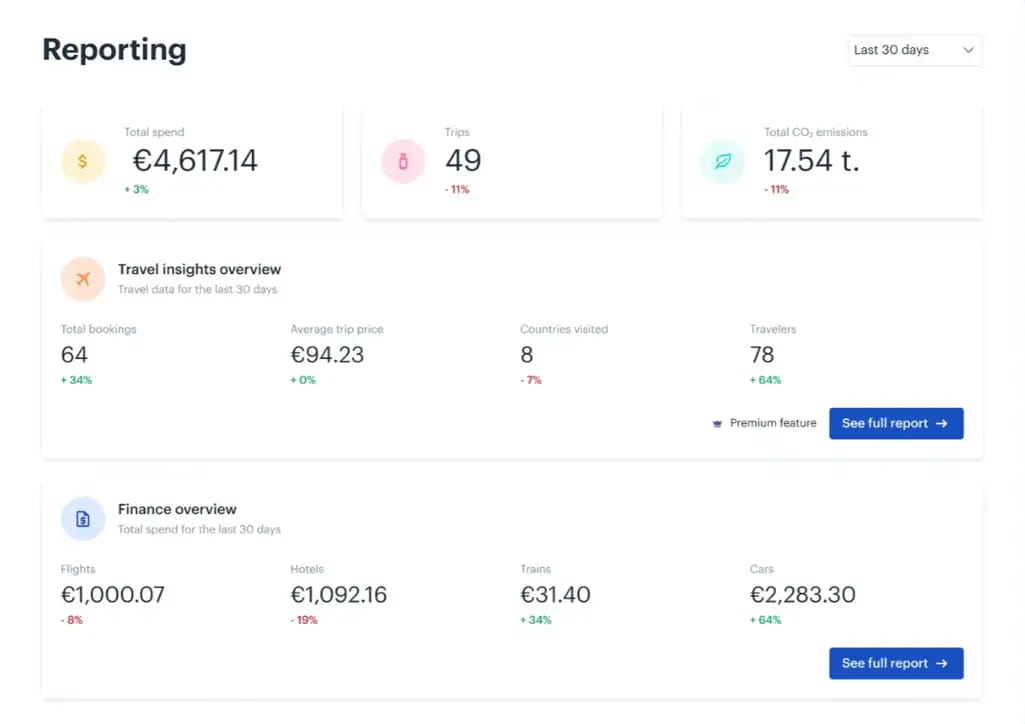
The reporting dashboards with the key metrics for analytics. Source: TravelPerk
The total spend analysis captures the overarching travel budget, facilitating informed future financial planning. The frequency and nature of business travels become evident with metrics like the number of trips, and modern platforms are leaning into sustainability with carbon footprint insights.
Diving deeper, the travel insights report may include a summary of total bookings, the average trip price to determine cost-effectiveness, a geographical breakdown of countries visited, and the number of travelers from the company to identify the most active departments or individuals, streamlining policy adjustments and potential discount negotiations.
A financial overview offers a granular look at expenses based on various travel modes such as flights, hotels, trains, and cars. It clarifies which mode is the most utilized and where most of the company's travel budget is being allocated. Often platforms include reports that track the total reimbursements processed over a certain period. This is especially vital for organizations where employees book using personal cards.
User support systems
User support systems in B2B travel platforms are designed to offer immediate and effective assistance to users. These systems encompass a range of resources and channels to address varying needs.
Information resources. These databases typically contain answers to frequently asked questions, step-by-step guides, tutorials, and other information. They allow users — whether they are CTMs or business travelers — to find solutions without the need for direct interaction with support personnel.
Direct support channels. These can range from phone support and email to live chat. They cater to customers who prefer a more direct interaction or have complex issues that require personalized attention.
Technical support. This specialized support branch resolves software glitches, bugs, and other system-related challenges. It ensures that the platform operates seamlessly and users do not encounter disruptions in their tasks.
Training resources. As user adaptability varies, many B2B travel platforms offer training modules, webinars, or workshops for anyone who is going to use their services. These resources ensure users can fully utilize the platform's features and are aware of any updates or changes.
An illustration of comprehensive user support can be found in SAP Concur's User Support Desk. They offer round-the-clock assistance, and their team is well-acquainted with both the system intricacies and individual corporate policies.
Buy or build: Choosing between off-the-shelf and custom B2B booking engines
In the world of corporate travel, choosing the right B2B booking engine can be a game-changer. An efficient and well-designed platform can streamline your operations and significantly boost your competitive edge. While both off-the-shelf and custom solutions have pros and cons, they often provide unparalleled benefits catering to your business needs.
Advantages of custom B2B booking platforms
A custom B2B travel platform is a tailored solution designed and developed to specifically meet your unique business needs and objectives. Such platforms offer several unique advantages.
Complete customization. Custom platforms allow you to build a system that perfectly aligns with your business needs. Predefined features or functionalities do not limit you.
Unique features. A custom platform allows you to innovate and include features unique to your business, providing exceptional value to your clients. For instance, in one of AltexSoft’s projects with an online travel agency, we built an internal online inventory management module to meet their unique needs to offer layover travel booking services. One key achievement was the development of a custom Output API. This allowed the agency to deliver its vast content repository to any travel platform's front end.
Owning the source code. Owning the source code of your platform gives you total control over it, including control over updates and modifications as it also protects you from potential vendor lock-ins.
Competitive advantage. Custom-built platforms can give you an unparalleled competitive edge. By offering features and functionalities tailored to your specific target audience, you can outperform competitors and distinguish yourself in the market.
Considerations for buying off-the-shelf B2B booking platforms
On the other hand, choosing an off-the-shelf B2B booking platform has its own set of factors. The promise of immediate deployment, lower upfront costs, and pre-existing features can be attractive for businesses aiming for rapid market entry with limited initial investment.
Here's an overview of a few notable B2B travel platforms tailored for corporate travel.
- SAP Concur is an industry leader that streamlines travel, expense, and invoice management. Its features include real-time expense tracking, integration capabilities, travel risk management, and 24/7 user support.
- TravelPerk is an integrated corporate travel management solution that focuses on modern businesses. It's built to cater to diverse corporate needs with offerings like FlexiPerk for booking flexibility, a comprehensive travel inventory, and insights into travel and expense data.
- TravelBank is a business travel and expense management platform that balances user experience and corporate oversight. It's known for integrated travel booking and predictive budget tools. Automated expense reporting and real-time travel insights further enhance its appeal.
- Navan (formerly TripActions) is another corporate travel and expense management solution with a wide range of features, such as dynamic travel booking, 24/7 traveler support, and comprehensive expense management tools.
While off-the-shelf solutions may provide a quick start, their benefits often come with compromises. They may lack the unique features, customization options, and scalability a custom-built platform offers. These factors are crucial for maintaining a competitive advantage and supporting long-term business growth. That's why, in many cases, investing in building a custom B2B booking platform can be a wise business decision.

